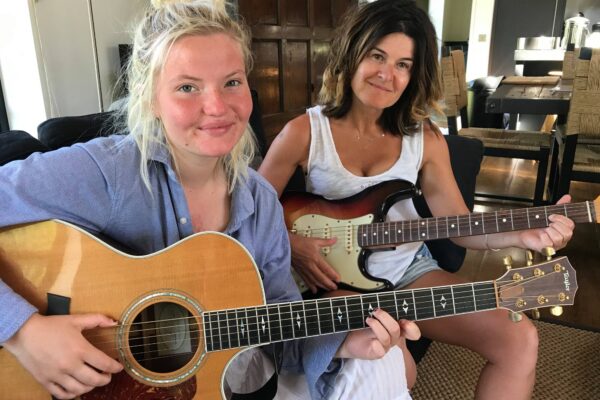
Mastering Guitar Scales
Mastering Guitar Scales: The Building Blocks of Music with Speed, Flair, and Euphoria
Learning guitar scales is like unlocking the secret language of music. It’s the foundation that gives you the tools to craft melodies, improvise with ease, and understand music theory at a deeper level. While the idea of mastering scales may feel overwhelming at first, with the right strategies, such as ingenuity, fluidity, and a dash of pizazz, you can transform this fundamental aspect of guitar playing into a journey of exhilaration.
Best Way to Learn Guitar Scales
In this guide, we’ll explore how to overcome common challenges, the importance of smart learning techniques, and how mastering scales can supercharge your guitar skills. Whether you’re just starting out or looking to refine your playing, this article is here to help you harness the euphoria that comes with scale mastery.
The Common Struggles Guitarists Face
For many guitarists, learning scales presents a series of hurdles that can feel frustrating if not approached correctly. Some of the most common struggles include:
- Difficulty Remembering Notes: The fretboard can feel like an endless sea of notes, making it tough to memorize the specific notes in a scale.
- Inconsistent Finger Placement: Poor finger positioning often leads to imprecision and a lack of fluidity in scale execution.
- Slow Playing Speed: Without proper technique, scales can be played too slowly, making practice feel tedious and unproductive.
- Position Changes: Transitioning smoothly between different positions on the fretboard is a frequent challenge, often leading to choppy playing.
- Lack of Fluidity: Many beginners struggle to make their scales sound smooth and connected, resulting in a disjointed performance.
- Relearning Scales: Constantly forgetting scale patterns and having to relearn them slows down progress.
These challenges arise from a lack of strategy and understanding. To overcome them, it’s crucial to adopt a learning approach that emphasizes both speed and fluidity.
The Power of Chunking: A Smart Approach
One of the most effective techniques for mastering scales is chunking—breaking down complex tasks into smaller, more manageable pieces. When it comes to scales, this method can transform what feels like a monumental task into something both achievable and enjoyable.
Applying Chunking to Guitar Scales:
- Start with a Few Notes: Rather than tackling the entire scale at once, begin by focusing on just a few notes. Master these before moving on.
- Gradually Add More: Once you’ve nailed the first few notes, start adding more to your sequence, building the scale in layers.
- Practice in Different Positions: To expand your versatility, practice the same scale in various positions across the fretboard. This not only improves your fretboard navigation but also sharpens your improvisational skills.
By using chunking, you’ll avoid the mental overload that often comes with learning scales and instead focus on speed, accuracy, and a gradual sense of mastery that feels both fluid and natural.
The Minor Pentatonic Scale: Your First Step with Flair
One of the best starting points for beginners is the minor pentatonic scale. This five-note scale is a staple in genres like blues and rock, known for its expressiveness and simplicity. With its familiar, soulful sound, mastering the minor pentatonic scale can boost both your confidence and enjoyment as you start to hear the results in your playing.
How to Play the Minor Pentatonic Scale:
- Start on the 5th Fret: Place your first finger on the 5th fret of the low E string (the thickest string) and your pinky finger on the 8th fret of the same string.
- Add the 7th Fret: Move to the 5th and 7th frets of the A string (the second thickest string), linking these notes to the original two on the E string.
- Continue Adding Notes: Add the 5th and 7th frets on the D, G, B, and high E strings, playing each string individually before connecting them.
By breaking down the scale into sections and focusing on one string at a time, you’ll find the process easier, more intuitive, and more enjoyable.
Overcoming Common Challenges with Ingenuity
Now that you’ve learned the basics of chunking and have a great starting point with the minor pentatonic scale, let’s address how to tackle some of the common struggles guitarists face when learning scales.
1. Difficulty Remembering Notes:
- Solution: Visualize the fretboard in patterns rather than individual notes. This will allow you to connect sections of the fretboard more easily. Additionally, practicing the scale in different keys will improve your memory and reinforce the patterns.
2. Inconsistent Finger Placement:
- Solution: Focus on finger accuracy by practicing scales at a slow tempo. Using a metronome can help you maintain consistency. As your accuracy improves, gradually increase your speed to enhance your fluidity.
3. Slow Playing Speed:
- Solution: Speed comes with practice, but it’s important to build speed after mastering accuracy. Start slow, but play consistently. As you improve, speed up your practice in increments, challenging yourself to play faster without sacrificing technique.
4. Position Changes:
- Solution: Practice moving between positions slowly and smoothly, paying close attention to the transitions. Scales like the CAGED system can help you visualize these positions across the fretboard.
5. Lack of Fluidity:
- Solution: Focus on your picking technique. Alternate picking (down and up strokes) will make your playing sound smoother. Combine this with legato techniques (hammer-ons and pull-offs) to add fluidity to your playing.
6. Relearning Scales:
- Solution: Make scales a regular part of your practice routine, rather than something you occasionally revisit. Practicing scales daily, even for just a few minutes, helps reinforce muscle memory and retention.
The Benefits of Learning Scales: Euphoria in Every Note
Mastering scales doesn’t just improve your technical skills—it opens the door to an entire world of musical expression and creativity. Here’s how learning scales can enhance your guitar journey:
1. Improved Finger Dexterity:
Practicing scales regularly increases your finger strength and coordination. You’ll notice your fingers moving more quickly and accurately across the fretboard, giving your playing a sense of speed and exhilaration.
2. Enhanced Understanding of Music Theory:
Learning scales helps demystify music theory. Understanding how scales work allows you to better grasp key signatures, chord progressions, and intervals. This deeper knowledge translates into a richer musical vocabulary.
3. Increased Improvisation Skills:
Scales provide the foundation for improvisation. Whether you’re jamming with friends or creating your own solos, mastering scales gives you the tools to confidently explore new musical ideas with flare.
4. Expanded Musical Vocabulary:
Scales expand your repertoire of musical phrases and patterns, giving you the freedom to express yourself in new and exciting ways. As you internalize more scales, you’ll have the ability to draw from a wide range of melodic ideas.
Guitar Scales
Mastering guitar scales is one of the most rewarding aspects of learning the instrument. By overcoming common challenges through techniques like chunking, focusing on key scales like the minor pentatonic, and integrating regular practice into your routine, you’ll build the fluidity, speed, and dexterity needed to reach new levels of playing. But more importantly, you’ll unlock the euphoria that comes from truly understanding and expressing music.
With every note you play, you’ll feel a surge of creative energy, and your guitar playing will begin to radiate with flareand pizazz. Scales are more than just patterns on the fretboard—they’re the gateway to musical freedom, allowing you to express your voice in ways that are inspired, exhilarating, and uniquely yours.
So pick up your guitar, embrace the power of chunking, and let the world of scales open up a world of possibilities in your playing. The journey might be long, but with patience, practice, and passion, you’ll be playing with both fluidity and integrity, ready to conquer any musical challenge that comes your way.







